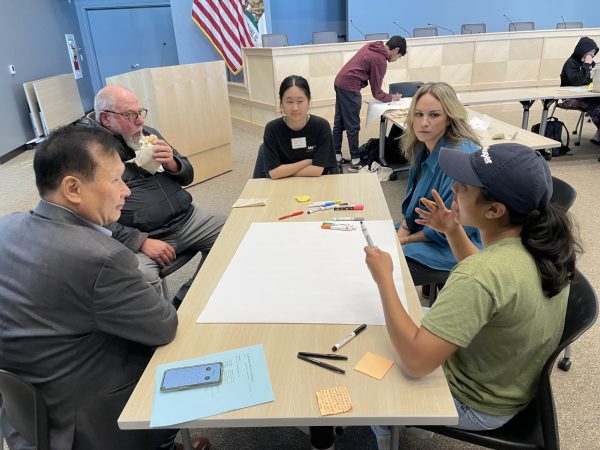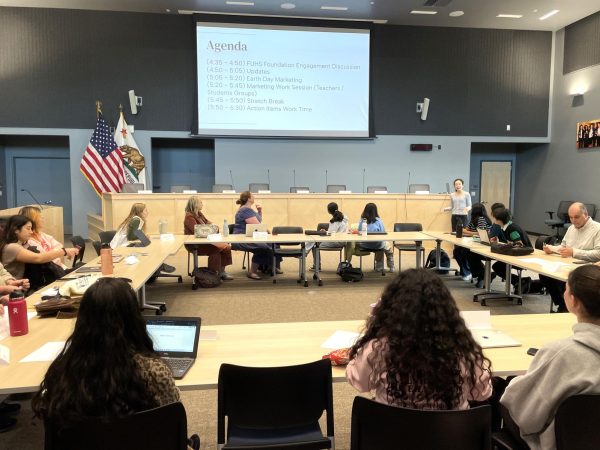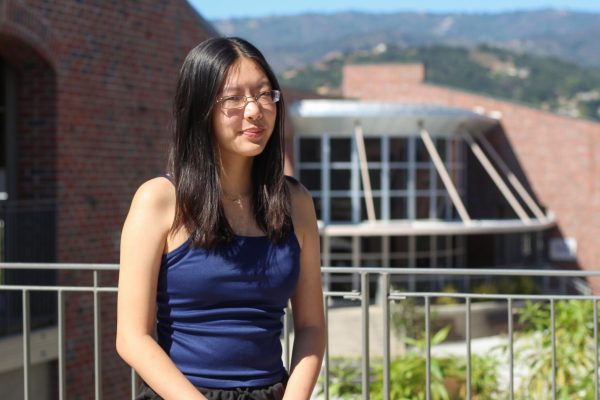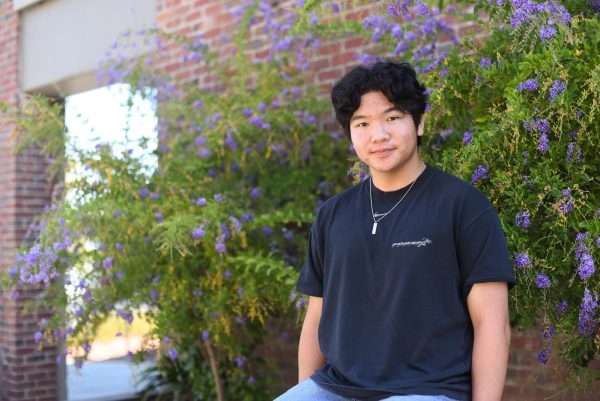Thirteen years ago, AP Chemistry teacher Kavita Gupta was teaching about acids and bases when she noticed her students were especially fascinated by the topic of ocean acidification. To supplement this curiosity, Gupta allowed the students to complete a climate-related project at the end of the school year, supporting the enthusiasm her students harbored. Gupta credits this experience as the initial inspiration for her joining the FUHSD Climate Collective (FCC) and jumpstarting its initiatives toward mitigating climate change.
“The lesson resonated with the students — they loved the learning that came with it,” Gupta said. “It resonated with our community. These students are engaged in it. They want to learn, and it helps bust some myths and move all of us toward a science-based understanding of what ocean acidification is, its issues and what we can all do. How can we all do our part rather than each of us thinking about something that might come in the future? How do you bring images, immediacy to this issue, and bring it close to home?”
Currently, Gupta serves as one of two teacher advisors for The FUHSD Climate Collective, a team consisting of students, teachers and district staff from all five high schools. The FCC started in the fall of 2023 and meets monthly to build curricular pathways for environmental literacy and sustainability education. Gupta attributes the current successes of the FCC, such as imposing paper recycling at FUHSD schools, to the passion of the students leading the team and hopes that more students will get involved in the future.
“Right now, we are just lifting it from the ground up,” Gupta said. “There is pretty good engagement for year one or year zero, but it will grow as students want to learn. This is not something that’s imposed from the outside. This is from their desire. And if anything, these atmospheric rivers in our changing climate, it’s just reinforcing the need to learn more about this.”

Junior and MVHS recycling lead Anushka Kumaran says the FCC is currently focusing on two district-wide projects: a recycling initiative and an FUHSD Earth Day event. Because she is more involved in the recycling initiative at MVHS, Kumaran is trying to increase the number of student volunteers for the recycling program by creating school announcements and sending out volunteer forms. She says that one area of improvement for the team is the type of material the recycling initiative encompasses. Although the recycling program is only focused on recycling paper this year, Kumaran hopes to expand the program to include bottles and other types of trash in the future.
“We hope to increase awareness of recycling in general and make sure that students within our community are aware that they do have an impact in the things that they do,” Kumaran said. “And a lot of people, oftentimes when it comes to climate change, feel like they can’t make a big change. But it’s every small little change — even if you recycle a piece of paper or the water bottle that you drink out of, it’s going to make a big impact.”
While Kumaran works primarily on increasing student engagement for the recycling initiative at MVHS, Cupertino High School senior and marketing team member Xinpei Lu is focusing on outreach for the Earth Day event. Their role in the marketing team is to promote the Earth Day festival by putting up flyers, creating school announcements and working with teachers and ASB members to spread awareness about the event. By joining the team, Lu can take direct responsibility and action against climate change for the benefit of the community, a desire they have had for some time.
“I want to help the district transition. I think that we’re in a crucial pivotal moment of climate change and awareness — that stage where we have to do the most we can do to prevent lasting, irreversible damage,” Lu said. “And so that kind of urgency pushes me forward to be like, ‘Okay, what can I do today to minimize the damage and do my part as part of a community?’”
The FUHSD Earth Day festival will be held on Thursday, April 11, from 5-8 p.m. at Mountain View’s Computer History Museum, and the FCC has invited keynote speakers such as Congressman Ro Khanna and National Geographic explorers. The event will include pre-program games such as photo booths and sustainable merch in the first hour, a seated program with keynote speakers and performances in the second hour and a student project showcase where students will present the climate-related initiatives they are working on in the third hour. As the FCC is still in the planning process of the event, Lu says one of the FCC’s goals is to include diverse perspectives in every aspect of each presentation and performance.
“We’re trying to be more holistic about what voices, ideas or perspectives we want to include,” Lu said. “So we want to include perspectives from all fields of studies like arts, humanities, STEM, all that stuff. We want to try to inform students about green career pathways and sustainability, what they can do with it and open their eyes to new possibilities.”
Kumaran emphasizes the importance of initiatives such as the FCC that focus on cooperation to mitigate climate change. To Kumaran, calling attention to community-wide issues of waste and climate brings people who are passionate about combating the problem together.
“I think in general, the only way we can fight against climate change as a whole is if we all work together to do so,” Kumaran said. “It’s great that all different students within schools have a chance to show what they’re interested in and bring their voices out, especially in front of a lot of different people who are board members and have power over what the schools will do in regards to climate change and design.”
While climate change awareness has spread recently through media and protesting, Lu says students often don’t change habits that can magnify environmental issues. Additionally, the diffusion of responsibility suggests people feel less responsibility for their actions in group settings. Lu stresses the importance of cooperation and initiative to make a substantial impact.

“When we do work on a local level, it sometimes feels like ‘this won’t work. It’s not going to change anything at the end,’” Lu said. “But I think the most impactful work you can do is at a local level because you know your community and your people the best. You know what needs to be done to create a better future for yourself and everyone involved. Working on a local level is one of the major ways to create change.”
From teaching a class of students eager to learn about ocean acidification to supporting a student-led collective taking action in communities to mitigate climate change, Gupta has seen the FCC cultivate from the ground up. She believes that the collective’s initiatives from both students and adults make the FCC unique in its establishment.
“We co-create — that’s a very powerful word,” Gupta said. “There are not many spaces in our system where we co-create stuff. So the FCC is unique because this is something students want to learn. They have an appetite to learn and want to dedicate their time to learn. And we are making that happen.”












